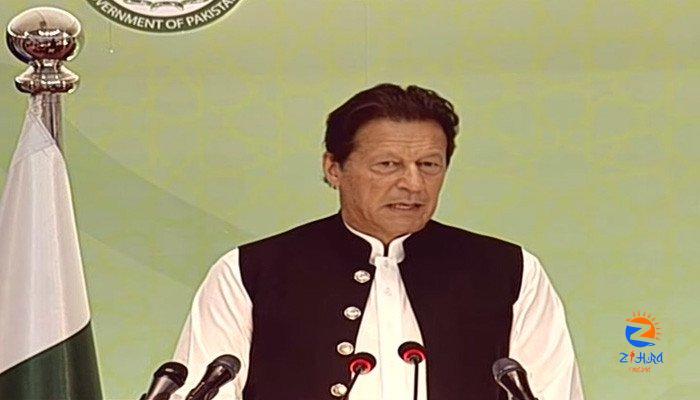
[ad_1]
ISLAMABAD: Prime Minister Imran Khan Tuesday held the leadership of Muslim states responsible for the spread of Islamophobia across the world.
Speaking at the 48th Session of the Organization of Islamic Cooperation (OIC) Council of Foreign Ministers in Islamabad, the prime minister said that a false narrative was established against the Muslims after the 9/11 tragedy that Muslims are terrorists.
“Unfortunately, we didn’t do anything to check this wrong narrative of Islamophobia and resultantly, the man on the street on the West came to believe this.”
Welcoming the guests, PM Imran said, “people of Pakistan are overjoyed on this special occasion as we are also celebrating our 75th anniversary this year.”
“I especially congratulate our OIC members because of a landmark resolution passed by the UN to mark March 15 as Day to Combat Islamophobia which is the day when a gunman attacked mosques in Christchurch.”
He said that Muslims were wrongly linked with terrorism by the world.
‘Reliable partners, not accomplice in aggression’
Earlier, in his address, Foreign Minister Shah Mahmood Qureshi said it was time for the Muslim Ummah to stay united and forge a collective response to the current turmoil inside its borders and the ongoing global transition.
“We must be a reliable partner in forging unity, justice, and development across the globe, but not anyone’s accomplice in aggression or domination,” he said.
The foreign minister said the time had come for the body to strengthen and equip itself to address contemporary challenges and conflicts confronting the Muslim Ummah.
He mentioned that the Muslim world was facing conflicts in the Middle East, prolonged foreign occupation, and the denial of the right to self-determination, most notably to the people of Palestine and Kashmir.
“The Muslim world’s resentment is increasing due to frequent external interventions in Muslim countries,” he said.
He pointed out that left unaddressed, these conflicts and disputes undermined the unity and solidarity of OIC countries, exposed the countries to foreign interference and intervention, fuelled terrorism and extremism, and deflected attention from development goals.
The FM encouraged the efforts of the Afghan authorities to eliminate Daesh (IS-K) and stressed effective strategies needed to deal with other terrorist groups in Afghanistan like TTP, ETIM, IMU, and Al-Qaida.
“We must guard against spoilers that wish to continue destabilising Afghanistan and using its territory to promote terrorism,” he said.
He expressed confidence that the conference would strengthen itself by developing and deploying tools for conflict prevention, mediation, reconciliation and peace-building.
OIC agenda
More than 100 resolutions will be considered during the two-day session of the OIC conference.
The summit will also discuss developments in Afghanistan and their humanitarian consequences for the Afghan people and the situation in Jammu and Kashmir.
Many African issues will also be on the summit’s agenda, including the situation in Mali, the Sahel region, and Lake Chad, and the situation in Central Africa and the Republic of Guinea.
The OIC foreign ministers will also discuss developments in Yemen, Libya, Sudan, Somalia, Syria, and other regions during the summit.
Pakistan has a proud history of hosting major OIC events including Summits and Council of Foreign Minister (CFM) meetings.
The country hosted the 2nd OIC Summit in Lahore, in February 1974. An Extraordinary OIC Summit was held in Islamabad in 1997, on the occasion of Pakistan’s Golden Jubilee.
Pakistan also hosted the OIC CFMs on four occasions, 2nd Session in December 1970, 11th Session in May 1980, 21st Session in April 1993 and the 34th Session in May 2007.
The 1st and the 17th Extraordinary Sessions of the OIC CFM, were held in Islamabad, in January 1980 and December 2021, respectively.
[ad_2]